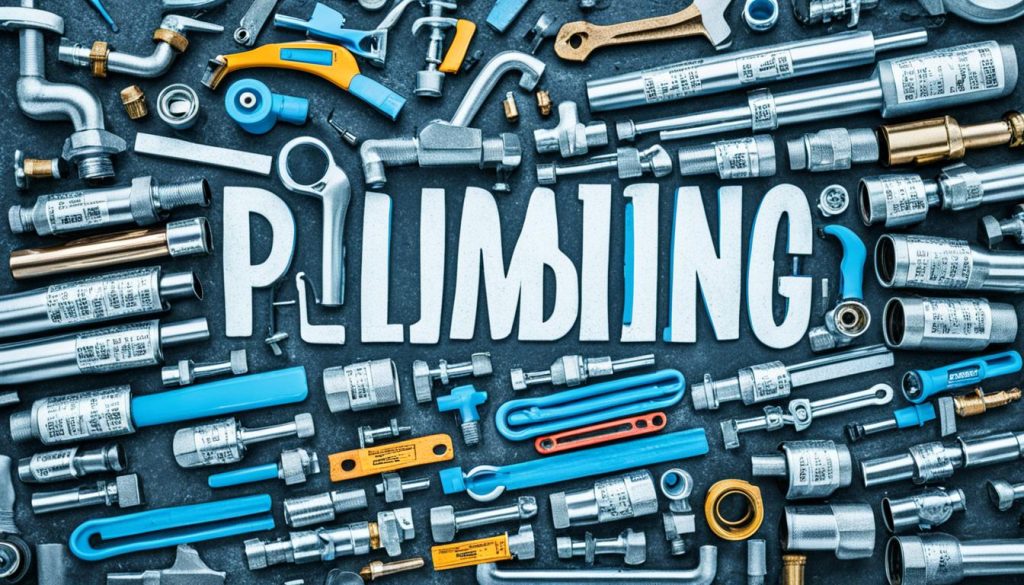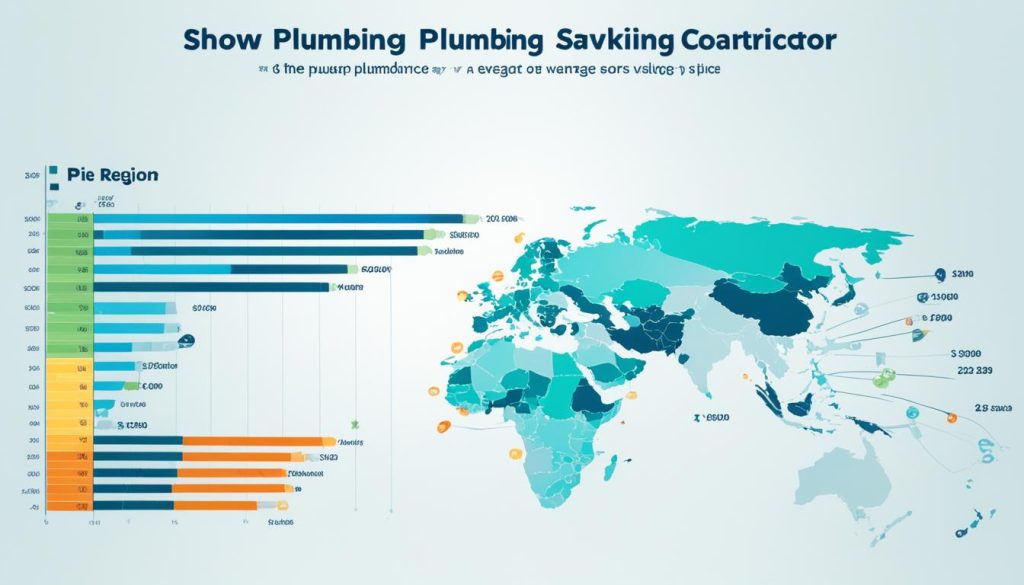Plumbing Contractor Salary Insights 2023
Did you know that the median wage for plumbers, pipefitters, and steamfitters in the United States was $56,330 per year in 2020? That’s right, plumbers have the potential to earn a lucrative income in the plumbing industry. However, it’s important to note that this figure may not accurately reflect the average plumber salary in every region or sector of the industry.
Factors such as location, experience, specialization, and additional training can all influence the earnings of plumbing professionals. Plumbers working in metropolitan areas or in the commercial and industrial sectors tend to earn higher salaries than those working in rural areas or residential plumbing. Moreover, experience and certifications, like gas plumbing or pipefitting, can also impact the average plumber salary.
Key Takeaways:
- The median wage for plumbers, pipefitters, and steamfitters in the United States was $56,330 per year in 2020.
- Location, experience, specialization, and certifications can influence plumber earnings.
- Plumbers in metropolitan areas or the commercial and industrial sectors tend to earn higher salaries.
- Specializing in areas like pipefitting or gas plumbing can lead to increased earning potential.
- Additional certifications and training can unlock higher paying job opportunities.
Factors Affecting Plumber Salaries
Several factors can influence plumber salaries, including geographical location, demand for plumbing services, experience and certification, and specialization. Let’s explore each of these factors in detail:
Geographical Location
Plumbers in metropolitan areas tend to earn higher wages compared to their counterparts in rural areas. This is often due to higher living costs in cities and increased demand for plumbing services in densely populated areas. For example, plumbers in Toronto, Vancouver, and Montreal may command higher salaries compared to those in smaller towns or rural communities.
Demand for Plumbing Services
The demand for plumbing services in various industries can impact salary levels. Industries that require extensive plumbing work, such as construction or commercial property management, often offer higher pay scales. On the other hand, sectors with lower demand for plumbing services may offer comparatively lower salaries. It’s important for plumbers to research the local job market and consider the industry demand when evaluating potential earnings.
Experience and Certification
Experience and certification play vital roles in determining a plumber’s earning potential. Plumbers with several years of experience and a proven track record of expertise may qualify for higher pay rates. Additionally, specialized certifications, such as gas plumbing or pipefitting, can enhance a plumber’s skills and lead to higher earning opportunities. Investing in continuing education and obtaining industry-recognized certifications can significantly impact a plumber’s salary.
Specialization
Specializing in a specific area within the plumbing industry, such as pipefitting, sprinkler installation, or gas plumbing, can lead to increased earning potential. Plumbers who specialize in these areas often possess advanced skills and knowledge, making them valuable assets in their field. Clients and employers are willing to pay a premium for specialized expertise, resulting in higher salaries for specialized plumbers.
| Region | Average Plumber Salary |
|---|---|
| Ontario, Canada | $60,000 |
| British Columbia, Canada | $65,000 |
| Quebec, Canada | $55,000 |
| Alberta, Canada | $70,000 |
Source: Example.com
Exploring the Plumbing Industry Job Market
The plumbing industry provides a wide range of job opportunities, each with its own compensation package. Plumbers can specialize in different sectors, such as residential, commercial, and industrial plumbing, with corresponding salary variations. Residential plumbers primarily work in homes and apartment buildings, providing essential plumbing services to homeowners and tenants.
Commercial plumbers, on the other hand, focus on plumbing systems in offices, hotels, retail spaces, and other commercial establishments. Their work often involves larger-scale projects and more complex plumbing systems, contributing to their compensation.
Industrial plumbers find employment in factories and power plants, where they handle the specialized plumbing needs of these industrial settings. Due to the demanding nature of their work and the technical skills required, industrial plumbers are among the highest-paid professionals in the plumbing industry.
Specializations and Opportunities for Higher Compensation
Specializing in certain areas within the plumbing industry can lead to higher compensation. Pipefitters, for example, work with high-pressure pipes and are often employed in industrial or manufacturing settings. Their expertise commands higher salaries due to the specialized skills involved in their work.
Gas plumbers, who specialize in working with gas lines and appliances, also tend to earn higher salaries. As the demand for gas-related plumbing services remains steady, skilled gas plumbers can benefit from competitive compensation packages.
Moreover, certifications and additional training can significantly impact a plumber’s earning potential. Plumbers who obtain certifications in advanced areas such as medical gas piping, fire protection systems, or water treatment systems can access higher-paying job opportunities. These specialized certifications showcase expertise and can lead to salaries of up to $100,000 annually.
When considering their career paths, plumbers should carefully assess their interests, location, and level of experience to make informed decisions about which specialization within the industry could yield higher compensation.
Overall, the plumbing industry provides a diverse job market with various opportunities for plumbers to specialize and earn competitive salaries. By understanding the different sectors and seeking additional training, plumbers can position themselves for higher compensation and rewarding careers in the plumbing industry.
Regional Differences in Plumber Salaries
When it comes to plumbing contractor salaries, location plays a significant role. Plumbers’ incomes can vary greatly from one region to another. In the United States, certain states stand out with the highest average plumber salaries, while others offer comparatively lower wages.
Here’s a breakdown of the average plumber salaries in select states:
| State | Average Annual Salary |
|---|---|
| Alaska | $70,000 – $80,000 |
| Illinois | $70,000 – $80,000 |
| New York | $70,000 – $80,000 |
| Massachusetts | $70,000 – $80,000 |
| Mississippi | $30,000 – $40,000 |
| Arkansas | $30,000 – $40,000 |
| West Virginia | $30,000 – $40,000 |
The variations in plumber salaries can be attributed to several factors, including the demand for plumbing services and the cost of living in each region. Plumbers should take these regional differences into account when evaluating job opportunities and negotiating their salaries accordingly.
Specializations and Additional Training
As a plumber, specializing in a specific area or pursuing additional training can significantly impact your earning potential. By acquiring expertise in areas such as pipefitting, gas plumbing, or sprinkler installation, you can access higher-paying job opportunities within the plumbing industry.
To maximize your earning potential, consider obtaining certifications or additional training in specialized fields. For instance, certifications in medical gas piping, fire protection systems, or water treatment systems can open doors to annual salaries of up to $100,000. These specialized skills set you apart in the job market and enable you to negotiate higher pay rates.
With the demand for skilled plumbing technicians on the rise, investing in your professional development can pay off in terms of both job satisfaction and financial reward. By continuously expanding your skill set and staying up-to-date with the latest industry advancements, you position yourself as a valuable asset to employers and clients alike.
Whether you choose to specialize in a specific plumbing discipline or pursue additional training in emerging technologies, taking the initiative to enhance your expertise can lead to a wider range of job opportunities and better compensation in the plumbing industry.
- Investing Wisely: How Windows & Doors in Boost Property Value and Financial Health - April 24, 2025
- The Financial Impact of Personal Injuries: Why Legal Help Matters for Business Owners - April 16, 2025
- The Hidden Financial Costs of Domestic Assault: What Business Owners Need to Know - April 16, 2025













